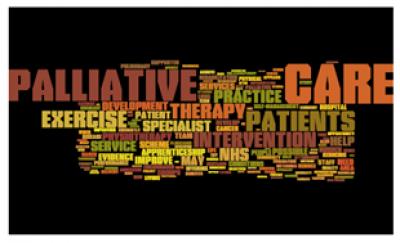Supporting Physical Activity Participation in Palliative Care
Supporting Physical Activity Participation in Palliative Care
Introduction

Research evidence shows that remaining physically active throughout life can improve quality of life and the ability to manage at home including activities of daily living and walking .
Physical activity participation is now promoted by government, healthcare providers, charitable and professional bodies. Research evidence and media awareness of these benefits has led to calls for more community based programmes to assist people living with long term conditions to manage their condition, maintain their quality of life for as long as possible and reduce burden on health service resources. ("Move More" above - Macmillan Cancer support 2014)
Our project to develop physical activity programmes for patients with palliative care needs began in 2010 when staff from Macmillan Day Care in Dundee attended the Scottish Macmillan Conference. We learned of the evidence, presented by Dr Anna Campbell, which exists to support physical activity in the control and prevention of symptoms of people living with a cancer diagnosis.
An exercise programme was already available in Macmillan Day Care for patients with advanced chronic obstructive pulmonary disease (COPD). Due to increased awareness of the benefits of exercise and cancer management, some of the patients with lung cancer were also keen to access the exercise class. The task was working out how to implement this generic class for patients with a wide variety of conditions, all at different stages of disease trajectories.
Methods

The opportunity to develop this idea arose through training offered by NHS Tayside ‘Practice Development Apprenticeship Scheme’. This was an opportunity for staff to engage with practice development, and to develop leadership and putting evidence into practice skills, whilst developing and implementing a practice development idea into a practical reality.
The apprenticeship was supported by the Allied Health Professions Directorate in NHS Tayside, led by Dr Jacqui Morris, AHP Research and Practice Development Lead NHS Tayside. The project was funded by monies from the Chief Health Professions Officer and following a recruitment process 6 AHPs were selected.
We met twice monthly for 6 months, learning about systematic review, evidence synthesis, process mapping, project planning and measurement and data analysis. The aim has been to train us to become leaders of practice development in our own clinical areas and assist others to develop their own ideas in service development.
We completed a literature review of the evidence for physical activity in a palliative care setting and discovered there was evidence showing that physical activity not only improves physical performance in most conditions but can also improve quality of life.
The aim of our project was to improve access to the exercise class for all patients and it was important that this service be offered to all patients based on their need not diagnosis. The challenge for us as clinicians working with such a diverse group of patients at varying stages of their disease trajectories was to ensure the intervention was clinically effective, safe and maximised our use of NHS resources.
It became apparent that the pulmonary and cardiac patients were well educated in their ability to self-manage their symptoms, based on their previous experiences of rehabilitation. However, the cancer patients in general were often fearful of physical activity, deconditioned and frequently reported they had spent the last 2 or 3 years ‘mostly sitting’ after treatment stopped. These patients continued to need healthcare professional support to help ‘pick up the pieces’ of their lives and move on.
We knew evidence existed to support appropriate exercise therapy in palliative care but what we didn’t know was how best to deliver it based on patient choices and preferences. The apprenticeship scheme offered the support and direction to ensure we gathered the appropriate evidence so that when the project completed in Oct 2013, we had the evidence which would help direct the service.
To do this it had been crucial to develop a ‘patient engagement plan’ in which we informed, engaged with and then consulted the patients who accessed the day care service.
We provided education sessions to teach patients the benefits of keeping active, set up focus groups with patients and asked what preferences they had for physical activity based on Macmillan Scotland’s recommendation of exercise groups, walking programmes and Chi Gung as suitable forms of physical activity for this patient group.
As we developed information leaflets about the services on offer, patients were asked for feedback throughout the process to ensure that what we were providing was what the patients wanted and understood. Emotional touchpoints were used and conveyed very powerful feelings from the patients relating to remaining physically active. Many of the patients felt very positive about helping to shape the service and were genuinely pleased to be involved.
Unless individual treatment is indicated, we can now offer exercise therapy in a group. In this way we can manage a full day’s list of patients in 1 ½ hours with much added benefit of group therapy and peer support for the patients.
Results
In line with the evidence, our outcome measures show improvement in functional performance and quality of life. Almost all patients have expressed an interest in walking programmes and Chi Gung and Macmillan has now offered Chi Gung training for staff to provide this on a long term basis. This will likely be beneficial for the frailer patients to avoid long periods of inactivity.
In line with patient preferences that we obtained through the project, we are now developing walking routes around Specialist Palliative Care Services. Paths For All have provided walk leader training for staff for the carefully identified bronze, silver and gold walking routes, to help build up patients levels of activity in a supported a safe environment.
Conclusions
As patients with life-limiting conditions are living longer with better symptom control, trying to find new ways to offer evidence based interventions to cope with this predicted increase in demand for rehabilitation is an on-going challenge.
An equitable service for all patients who require it should be offered as early as possible in the patient pathway, optimising the ‘teachable moment’, usually at diagnosis when health behaviour change can be facilitated most readily.
Now, we aim for 100% screening of physical activity levels of all patients referred to the day care unit and offer advice in line with the Scottish Physical Activity Pathway.
The apprenticeship scheme has turned ‘an idea’ into a sustainable reality now and hopefully long term into the future. There has been lots of learning, lots of hard work and lots of reward to see patients benefit, maximising functional performance, minimising symptoms and promoting quality of life, throughout life.
Mandy Trickett, Macmillan Specialist Physiotherapist,NHS Tayside
Contact: email or telephone: 01382 660111 ext 26170